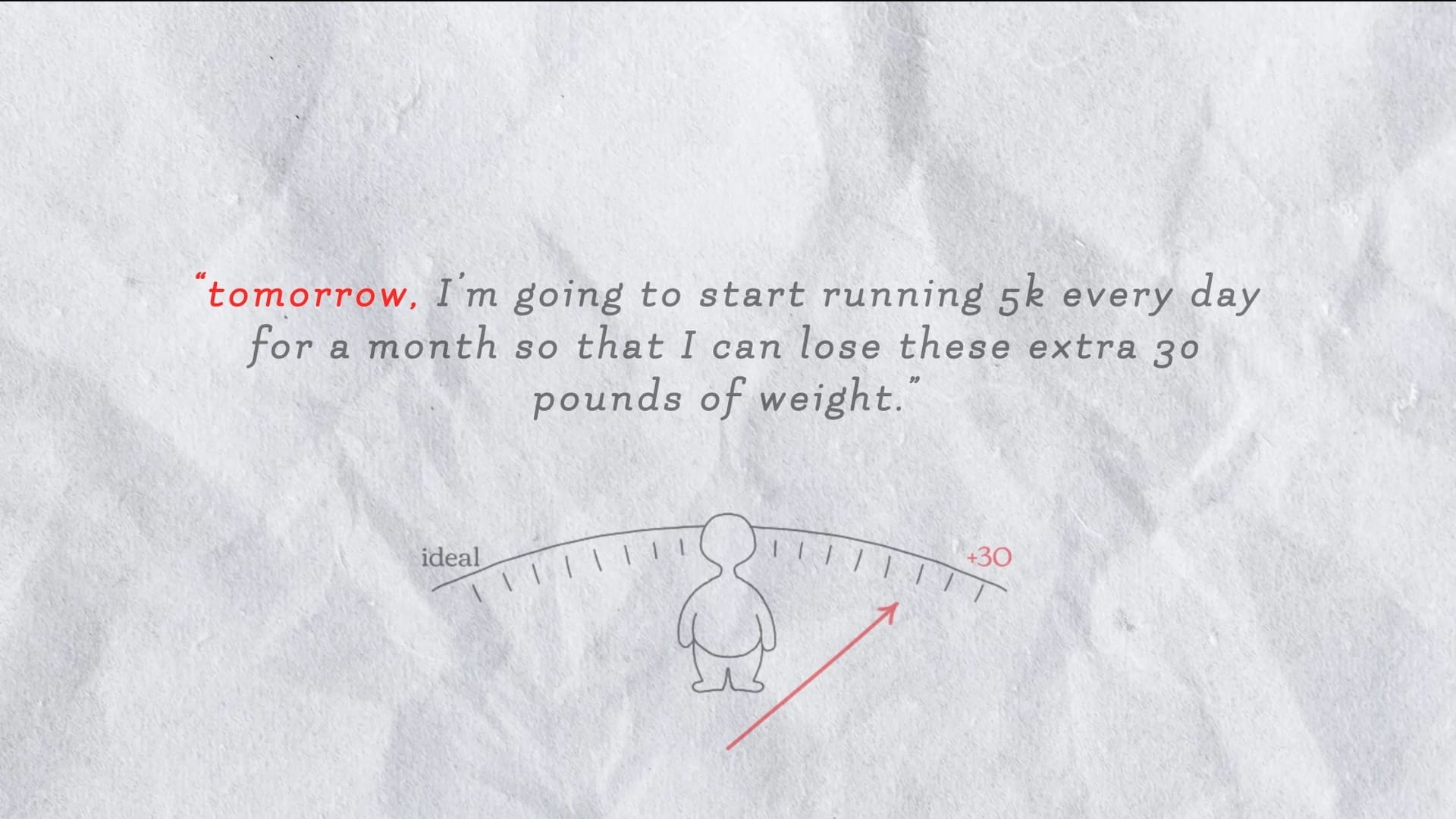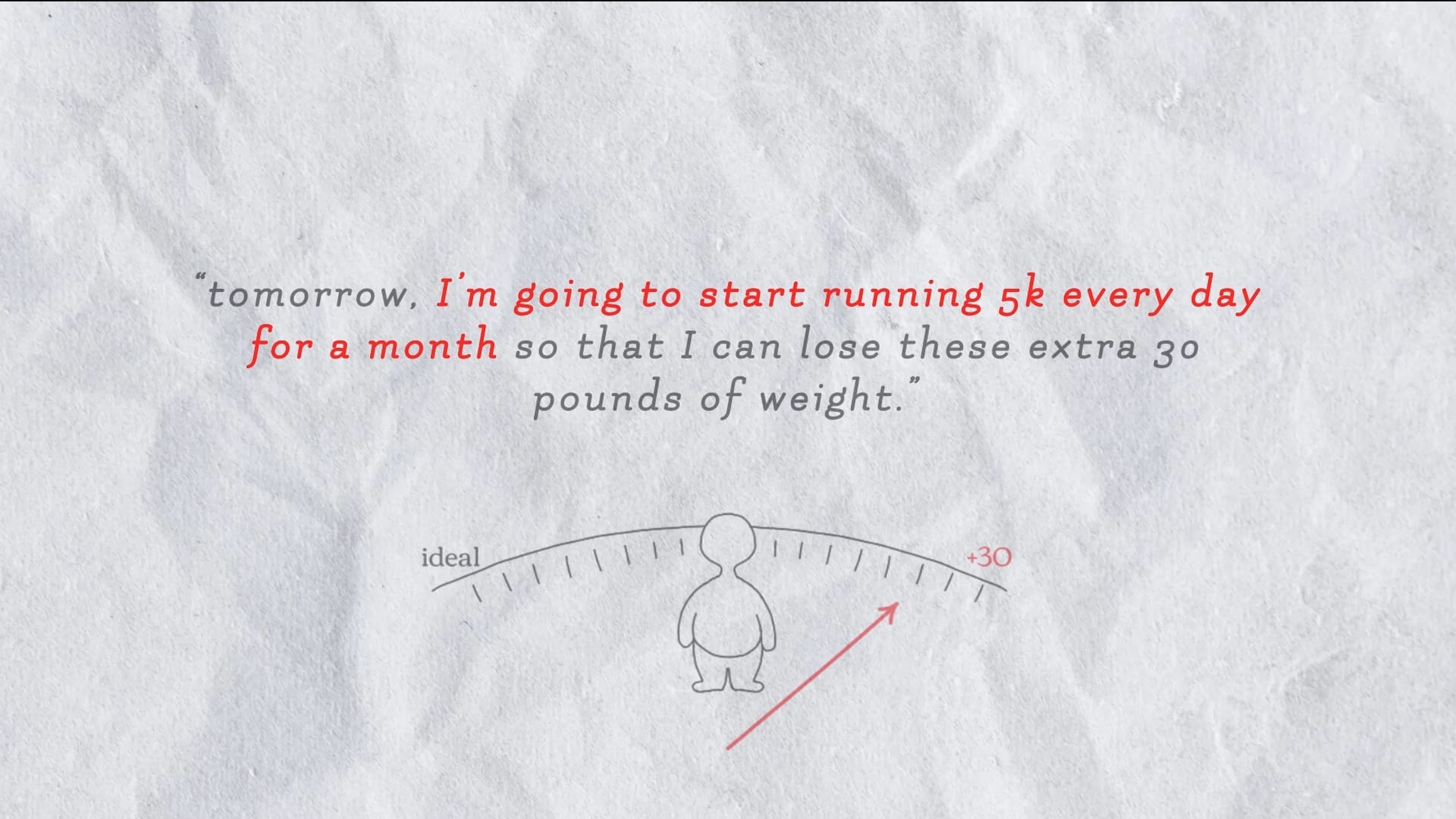Why it's so Hard to Form New Habits
(If you prefer to watch, check out my video on YoutTube!
We’ve all been there before, we’re unhappy with a part of our lives and we want a change. So we tell ourselves, “Tomorrow, I’m going to start running 5k every day for a month so that I can lose these extra 30 pounds of weight.” The rest of the day we feel really good about ourselves, proud that we decided to make a change and said enough was enough.
Then tomorrow comes around and we’re woken by the alarm we set. We remember our goal, roll over, and… get back to sleep.
FAILURE.
Why? Why is it so hard to make change stick?
The issue here is multifaceted, but a lot of it comes down to the way we set up our goal. So, let’s break it down:

Right off the bat, we’ve started off on the wrong foot. We put the task of making a change off to the future, instead of starting straight away. Subconsciously, we’re communicating to ourselves that the change isn’t that important and instead we’ve relegated it to some abstract future in which we may or may not actually follow through on our intentions, however good they may be. Instead, aim to commit to a change as soon as possible if you want to successfully establish a new habit. Because if you aren’t willing to commit to it now, then what’s to say that you’ll commit to it when that abstract moment in the future becomes the present? Life happens in the present moment, and therefore the only time change can happen is in the present. If you’re serious about something, do it as soon as possible.
But let’s say you did actually get up and start running…

There’s two likely outcomes here.
#1
The first is that you’re out the door running and you feel great. 10 minutes in, though, it’s a different story. Your heart is pounding and your breath sounds more like wheezing. Eventually, you stop, turn around and walk back home – before reaching your 5k goal.
The rest of the day, instead of feeling proud and accomplished that you at least got up when you said you would and ran as much as was within your current physical capability, you beat yourself up about not having met your goal. The next day, when the alarm rings, the negative associations you made about running the day before and any other time you’ve tried to make it a habit are at the forefront of your mind, so you roll over, disable the alarm, and get back to sleep.
FAILURE.
#2
The second is that maybe you really did push yourself to run the whole 5k. Though a success on the surface, this can still be problematic because, by the end of it, you were probably so exhausted that you swore to yourself: “never again” at which point, you started wishing you had just rolled over and went back to sleep while you still had the chance. This means that you’re back at square one… or maybe even worse off because now, as in the previous scenario, you have negative associations tied to running and maybe even working out in general.
FAILURE.
So are you just doomed to failed? Forced to accept your destiny as being unfit and seemingly lazy?
No. You aren’t the problem. The problem is the fact that you told yourself you were going to run 5k – after years of not running or doing any other form of exercise. The moment you did that, you stacked the odds against yourself.
Why do we do this? Again, the reason is multifaceted: We think that we won’t see significant change if we don’t do something drastic. We think 5k sounds cool and impressive and we want to see ourselves as cool, impressive people. Plus it’s a number that we’ve been trained to think of as one that a fit person can easily do, so, by deductive reasoning, if we can run a 5k, then we must be fit and one step closer to achieving our goal.
And while, yes, this is true, it doesn’t mean you have to run a 5k right now. As the old saying goes, you have to walk before you can run, and in this case I think it can be applied pretty literally. After years of inactivity, you probably can’t physically run a 5k and that’s okay. What’s important is that you introduce more activity into your life – that you work your way up to a 5k. And yes, that can look like walking, like the saying says, but it can also be jogging for shorter amounts of time/distance, or swimming, or doing yoga, or biking, or doing stairs; whatever floats your boat.
The benefits of setting a goal which you can actually reasonably achieve are several, but they fall under two main categories: mental and physical.
By setting a more manageable goal, both the mental and physical hurdles you have to overcome to do it are a lot smaller. And since they’re smaller, you’re a lot more likely to actually follow through. Once you do, you’ll have the satisfaction and gain the confidence that only comes from actually doing something you set out to do, so if you ran half a mile this time, then a mile starts looking a lot less intimidating.
Besides, your body will now be better conditioned to eventually run that one mile. And once you can easily run one mile, then you can increase it to two, and so on until you can finally run a 5k… Without all the mental and physical suffering that comes with setting a goal that’s too unrealistic and mighty.
(As a sidebar, this may seem to counteract my first tip, where I told you that if you’re serious about something, do it as soon possible, but by running a half a mile first, you are working on eventually running a 5k. You aren’t putting that goal off into some far-off future, you’re just being realistic about where you are now and what it takes to get there.)
So, now we’re in a pretty good spot. For the past week we’ve been setting smaller goals and accomplishing them. This has given us the fuel to see the challenge through for the whole month, like we initially set out to do.

At the end of the month, we whip out the scale, anxiously set one foot on it, then the other, and, heart pounding, look down as the scale finally settles on a number. Only 5 pounds less than before.
Suddenly all the energy and motivation we had built up towards attaining our goal vanishes, along with any newly-found confidence. We look in the mirror and all we see is failure. So, even though we had been on a great track for the past month and were almost at a point where we could honestly say that running had become a habit, the next day when the alarm rings, we roll over, disable it and get back to sleep.
FAILURE.
Unfortunately, forming a new habit can be a finicky process, and at the beginning there’s a lot of room for ‘failure.’ So, even though we avoided some the biggest initial pitfalls, we were still only ever heading towards failure, again not because of something intrinsic about us, but because of how we set the goal up for ourselves. Similar to the last pitfall, we set too extreme of a goal… probably because we just didn’t know any better. That’s why it’s important to research your goal before beginning. By doing this, we would’ve learned that a healthy rate of weight loss is about 6-8 pounds a month (depending on your initial weight), which means that losing 30 pounds would have either been impossible or life-threatening. While doing our research, we might’ve also found that diet contributes a lot more to weight loss than exercise, so we might’ve shifted our methods to reflect that and therefore made better use of our time and energy.
Now we’re well on our way towards achieving our desired outcome.
So now, you can see why, in the way we originally set our goal up, we were almost guaranteed to fail. There’s power in the set-up and just by making these tiny shifts, you will hugely increase your chance of success. And the best part is that this applies to all habit-forming, not just to running and exercise. As a summary, here’s some do’s and don’ts:
DON’T
delay
set unrealistic goals
have unrealistic expectations
DO
start as soon as you can
set more manageable goals
your research computer
Unfortunately, these aren’t the only hurdles in successfully establishing a habit, so I’ve written a few more blogs that address habits and habit-forming. I’ll leave a link to them here.
